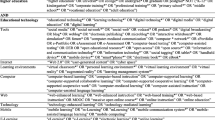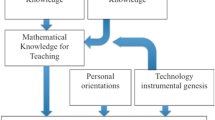Abstract
The last decade has seen the development in France of a significant body of research into the teaching and learning of mathematics in CAS environments. As part of this, French researchers have reflected on issues of ‘instrumentation’, and the dialectics between conceptual and technical work in mathematics. The reflection presented here is more than a personal one – it is based on the collaboration and dialogues that I have been involved in during the nineties. After a short introduction, I briefly present the main theoretical frameworks which we have used and developed in the French research: the anthropological approach in didactics initiated by Chevallard, and the theory of instrumentation developed in cognitive ergonomics. Turning to the CAS research, I show how these frameworks have allowed us to approach important issues as regards the educational use of CAS technology, focusing on the following points: the unexpected complexity of instrumental genesis, the mathematical needs of instrumentation, the status of instrumented techniques, the problems arising from their connection with paper & pencil techniques, and their institutional management.
Similar content being viewed by others
REFERENCES
Abric, J.C. (1987). Coopération, compétition et représentations sociales. Suisse: Editions del Val.
Artigue, M. (1997). Le logiciel DERIVE comme révélateur de phénomènes didactiques liés à l'utilisation d'environnements informatiques pour l'apprentissage. Educational Studies in Mathematics 33(2): 133–169.
Artigue et al. (1998). Intégration de calculatrices complexes à l'enseignement des mathématiques, Cahier DIDIREM spécial no. 3. IREM Paris 7
Artigue, M. (2002). Quelques leçons des ingénieries didactiques. In D. Guin and L. Trouche (Eds), L'instrumentation de calculatrices symboliques: un problème didactique. Grenoble: La Pensée Sauvage.
Balacheff, N. (1994). La transposition informatique. Note sur un nouveau problème pour la didactique. In M. Artigue et al. (Eds), Vingt ans de Didactique des Mathématiques en France (pp. 364–370). Grenoble: La Pensée Sauvage.
Biribent, A. (2001). Articulation entre la calculatrice et l'approximation décimale dans les calculs numériques de l'enseignement secondaire français. Thèse de doctorat, Université de Grenoble 1.
Bosch, M. and Chevallard, Y. (1999). La sensibilité de l'activité mathématique aux ostensifs. Objet d'étude et problématique. Recherches en Didactique des Mathématiques 19(1): 77–124.
Brousseau, G. (1996). Theory of Didactic Situations. Dordrecht: Kluwer Academic Publishers.
Chevallard, Y. (1985). La transposition didactique. Grenoble: La Pensée Sauvage.
Chevallard, Y. (1992). Concepts fondamentaux de la didactique: Perspectives apportées par une approche anthropologique. Recherches en Didactique des Mathématiques 12(1):77–111.
Defaouad, B. (2000). Etude de genèses instrumentales liées à l'utilisation d'une calculatrice symbolique en classe de première S. Thèse de doctorat, Université Paris 7.
Drijvers, P. (2000). Students encountering obstacles using CAS. The International Journal of Computers for Mathematical Learning 5(3): 189–209.
Grugeon, B. (1995). La transition entre enseignement professionnel et enseignement général: le cas de l'algèbre élémentaire. Thèse de doctorat, Université Paris 7.
Guin, D. and Delgoulet, J. (1997). Etude des modes d'appropriation de calculatrices graphiques et symboliques dans une classe de seconde. IREM de Montpellier.
Guin, D. and Trouche, L. (1999). The complex process of converting tools into mathematical instruments: the case of calculators. The International Journal of Computers for Mathematical Learning 3(3): 195–227.
Hirlimann, A., Lehning, H. and Monaghan, J. (Eds) (1996). Computer algebra systems in French secondary schools. International Derive Journal, Special issue 3(3).
Kahane, J.P. (2002). L'enseignment des Sciences Mathématiques. Paris: Odile Jacob.
Kendal, M. and Stacey, K. (2001). The impact of teacher privileging on learning differentiation with technology. The International Journal of Computers for Mathematical Learning 6(2): 143–165.
Kovacs, A. (1999). Computer algebra: Impact and perspectives. Nieuw Archief voor Wiskunde 17(1): 29–55.
Kuhn, T. (1962). The Structure of Scientific Revolutions. Chicago: University Press.
Kutzler, B. (1994). The future of teaching mathematics. International Derive Journal 1(1): 37–48.
Lagrange, J.B. (1999). Techniques and concepts in pre-calculus using CAS: A two year classroom experiment with the TI92. The International Journal for Computer Algebra in Mathematics Education 6(2): 143–165.
Lagrange, J.B. (2000). L'intégration des instruments informatiques dans l'enseignement: Une approche par les techniques. Educational Studies in Mathematics 43(1): 1–30.
Lagrange, J.B. et al. (2000). De l'analyse de travaux concernant les TICE à la définition d'une problématique de leur intégration à l'enseignement, Rapport de recherche. IREM Paris 7.
Lagrange, J.B. et al. (2001). A meta study on IC technologies in education. in, M. van den Heuvel-Panhuizen. Proceedings of the 25th Conference of the International Group for the Psychology of Mathematics Education, vol. 1 (pp. 111–122). Utrecht: Freudenthal Institute.
Schneider, E. (2000). Teacher experiences with the use of a CAS in a mathematics classroom. The International Journal for Computer Algebra in Mathematics Education 7(2): 119–141.
Sierpinska, A. and Lerman, S. (1996). Epistemologies of mathematics and mathematics education. In Bishop et al. (Eds), Handbook of Research in Mathematics Education (pp. 827–876). Dordrecht: Kluwer Academic publishers.
Trouche, L. (1994). Calculatrices graphiques: La grande illusion. Repères IREM 14: 39–55.
Trouche, L. (1996). Enseigner en terminale S avec des calculatrices graphiques et formelles. IREM de Montpellier.
Trouche, L. (1997). A propos de l'apprentissage de functions dans un environnement de calculatrices, étude des rapports entre processus de conceptualisation et processus d'instrumentation. Thèse de doctorat, Université de Montpellier.
Trouche, L. et les élèves de terminale 5S (1998). Expérimenter et prouver. Faire des mathématiques au lycée avec des calculatrices symboliques. IREM de Mon-tpellier.
Trouche, L. (2000). La parabole du gaucher et de la casserole à bec verseur: étude des processus d'apprentissage dans un environnement de calculatrices symboliques. Educational Studies in Mathematics 41: 239–264.
Vergnaud, G. (1990). La théorie des champs conceptuels. Recherches en Didactique des Mathématiques 10(2.3): 133–170.
Vérillon, P. and Rabardel, P. (1995). Cognition and artifacts: A contribution to the study of thought in relation to instrumented activity. European Journal of Psychology of Education 10(1): 77–101.
Author information
Authors and Affiliations
Rights and permissions
About this article
Cite this article
Artigue, M. Learning Mathematics in a CAS Environment: The Genesis of a Reflection about Instrumentation and the Dialectics between Technical and Conceptual Work. International Journal of Computers for Mathematical Learning 7, 245–274 (2002). https://doi.org/10.1023/A:1022103903080
Issue Date:
DOI: https://doi.org/10.1023/A:1022103903080




